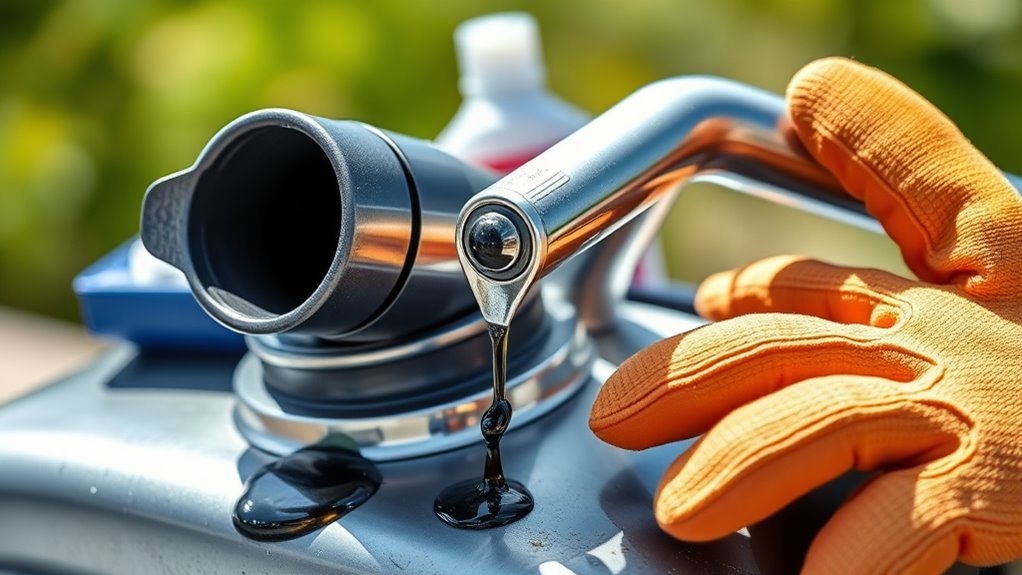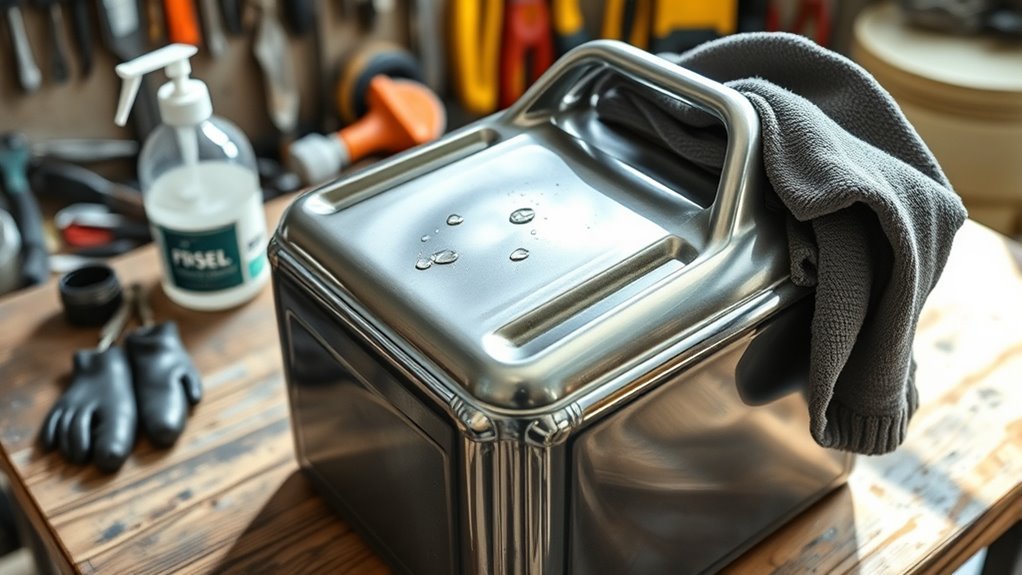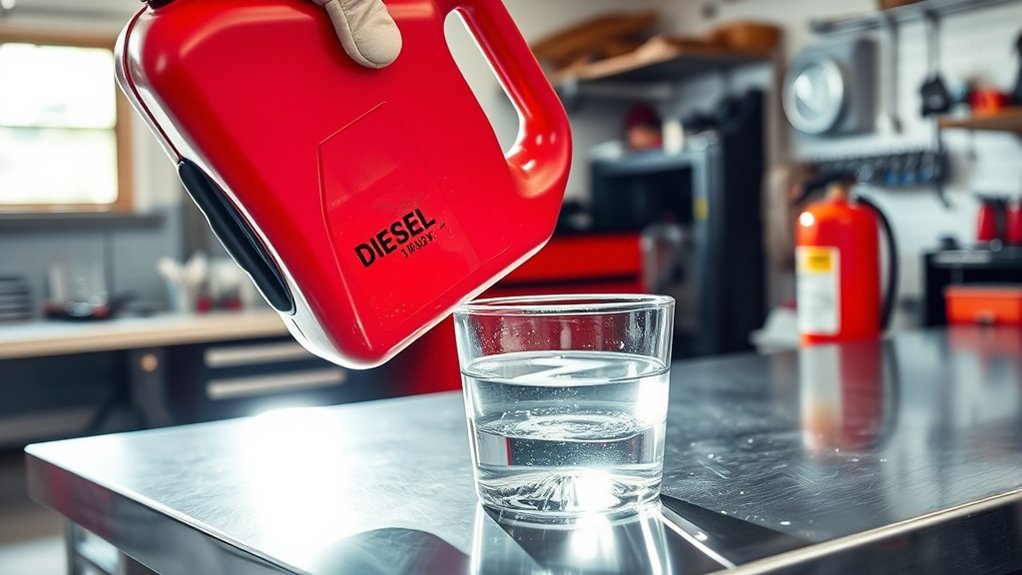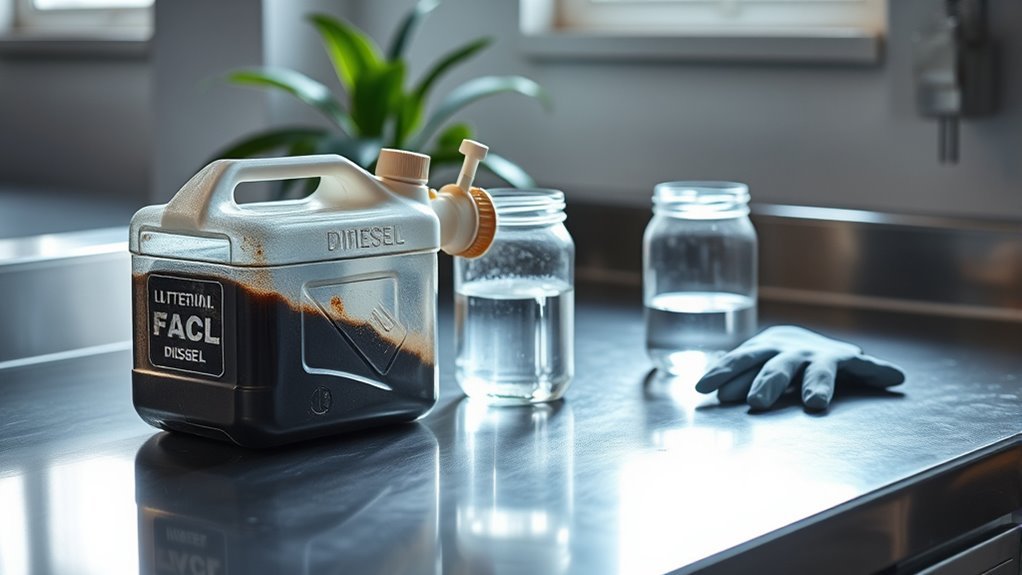How to Clean Diesel Out of Gas Can
To clean diesel out of your gas can, start by safely disposing of any remaining diesel fuel. Use a cleaning solution made from warm water and degreaser. Shake the can vigorously, then scrub any stubborn residue with a brush. Rinse thoroughly with clean water. Always work in a well-ventilated area and wear protective gear. Regular inspections can help prevent future contamination. Continue exploring tips to keep your gas can in prime condition.
##

In this article, we will provide you with essential information on the importance of cleaning diesel out of a gas can to prevent contamination and ensure the optimal performance of your gasoline engines. Understanding the differences between diesel and gasoline, including their varying properties and combustion characteristics, is crucial to maintaining your engine’s efficiency. We will guide you through the necessary steps to inspect and clean your gas can, ensuring it is free from diesel traces. By following our recommendations, you’ll be equipped to maintain your fuel’s integrity, avoid costly repairs, and enjoy the reliable performance of your machinery. Get ready to empower your pursuits with the knowledge and strategies for proper gas can maintenance!
Preparation For Cleaning
Before you begin the cleaning process, it’s essential to gather the right materials and guarantee a safe working environment. Start by identifying the fuel types involved; knowing whether you’re dealing with diesel or other contaminants will guide your cleaning methods. Confirm you’re working in a well-ventilated area, free from ignition sources. Wear appropriate personal protective equipment, such as gloves and goggles, to shield yourself from harmful substances. Have absorbent materials on hand to manage any spills. A secondary container for transferring liquids is also necessary. By preparing properly, you’ll set yourself up for efficient cleaning and minimize risks associated with handling hazardous materials. Taking these steps is critical for a successful cleaning operation.
Tools and Chemical Required

With the right preparation in place, you can now focus on the tools and chemicals required to effectively remove diesel from a gas can. Gathering the right materials is essential for a successful cleanup. You’ll need cleaning solvents to break down the diesel and absorbent materials to soak up any residue.
Here’s a quick overview of what you’ll need:
| Tools | Chemicals |
|---|---|
| Gloves | Degreaser |
| Scrub brush | Dish soap |
| Funnel | Isopropyl alcohol |
| Rags or towels | Cleaning solvent |
How to Clean:

Step 1: Safely Dispose of Remaining Diesel Fuel
- Before cleaning, make sure to properly dispose of any leftover diesel fuel in the gas can.
- Check local regulations for disposal methods, as improper disposal can be hazardous to the environment.
- Consider taking the diesel to a recycling facility or local hazardous waste disposal site.
Step 2: Prepare Cleaning Solution
- Gather your cleaning materials: warm water, degreasing detergent, a scrubbing brush or cloth, and vinegar.
- Mix a solution of warm water and degreasing detergent in a separate container.
- Ensure the mixture is well combined, as this will help in breaking down the oily diesel residue.
Step 3: Apply Cleaning Solution
- Pour the degreasing solution into the diesel gas can.
- Secure the lid on the can and shake it vigorously to ensure the mixture reaches all surfaces inside.
- Pay particular attention to areas where residue may be more stubborn or concentrated.
Step 4: Scrub Stubborn Residue
- If any stubborn residue remains after shaking, use a scrubbing brush or a cloth.
- Manually scrub the interior surfaces of the can, focusing on corners and crevices where diesel may accumulate.
- Use additional cleaning solution as needed to aid in the scrubbing process.
Step 5: Rinse Thoroughly
- After scrubbing, empty the cleaning solution from the can.
- Rinse the can thoroughly with clean, warm water to remove any remaining soap or diesel smell.
- Repeat the rinsing process until the water runs clear and free of any detergent or odor.
Step 6: Neutralize Odors
- To ensure that any lingering odors are neutralized, prepare a vinegar solution.
- Mix equal parts of water and vinegar, then pour this solution into the can.
- Shake the can again and let the vinegar solution sit for a few minutes before rinsing with clean water once more.
Step 7: Allow to Dry
- After rinsing, place the gas can upside down to drain any excess water.
- Allow the can to dry completely in a well-ventilated area before storing it or using it for gasoline.
- Ensure that the can is fully dry to prevent any moisture from mixing with the gasoline later on.
Safety Consideration

When cleaning diesel out of a gas can, it’s essential to prioritize safety to prevent accidents and health risks. Diesel fuel poses a significant fire hazard, so guarantee you work in a well-ventilated area, away from open flames or sparks. Always wear personal protective equipment, including gloves, goggles, and a respirator, to protect yourself from harmful vapors and skin contact. Make sure to have a fire extinguisher nearby, just in case. Keep all cleaning materials and waste contained and disposed of properly to minimize environmental impact. Remember, safety isn’t just about following rules; it’s about taking responsibility for your well-being and that of others. Stay alert and cautious throughout the cleaning process.
Tips to keep clean for long time
Maintaining a clean gas can is essential for guaranteeing its longevity and safe use. To achieve this, implement preventive maintenance regularly. After each use, rinse the can with clean water to remove any residue. Store your gas can in a cool, dry place, away from direct sunlight, to prevent deterioration. Consider using airtight storage solutions to keep contaminants at bay and to mitigate any chance of residual diesel affecting future fuel. Label your cans clearly, marking contents to avoid mix-ups. Regularly inspect for rust or leaks, addressing issues immediately. By following these steps, you’ll not only extend the life of your gas can but also guarantee that it remains safe and ready for your next adventure.
Frequently Asked Questions
Can I Use the Gas Can After Cleaning?
Yes, you can reuse the gas can after cleaning. To guarantee it’s safe, employ effective cleaning methods like rinsing with a degreaser or a soap solution to remove all traces of diesel. Rinse thoroughly with water and let it dry completely. Check for any lingering odors or residues before using it for gasoline. Properly cleaned, your gas can should work just fine, allowing you to maintain your freedom in fueling different equipment.
How Often Should I Clean My Gas Can?
You should clean your gas can at least once a year, or more frequently if you notice residue build-up. Imagine trying to start your lawnmower only to find it sputters due to dirty fuel—frustrating, right? Regular cleaning frequency is key for effective gas can maintenance. If you frequently use your can, consider a quarterly check-up to guarantee it’s free from contaminants, keeping your equipment running smoothly and giving you the freedom to tackle any project.
What if Diesel Smell Persists After Cleaning?
If the diesel smell persists after cleaning, you might need to employ additional cleaning techniques. Try using a mixture of vinegar and water or a specialized odor removal solution. Swirl it around inside the can, then let it sit for a few hours. Rinse thoroughly and allow it to air dry completely. If the odor remains, repeating the process or using activated charcoal can also help absorb lingering smells effectively.
Is It Safe to Dispose of Cleaning Materials?
“Better safe than sorry,” especially when it comes to disposing of cleaning materials used for diesel. You should avoid throwing these materials in regular trash; instead, check local regulations for safe disposal methods. Many areas have hazardous waste facilities where you can properly dispose of contaminated rags or solvents. Ensuring safety not only protects the environment but also keeps you and your community safe from potential hazards.
Can I Use Vinegar for Cleaning Instead?
Yes, you can use vinegar as an alternative cleaner. Vinegar’s effectiveness in breaking down grime and odors makes it a viable option for various cleaning tasks. However, for tougher residues like diesel, you might find its results less satisfactory compared to specialized cleaners. If you’re looking for a more powerful solution, consider combining vinegar with baking soda or opting for commercial cleaners designed specifically for heavy-duty applications. Always guarantee proper ventilation when cleaning.






